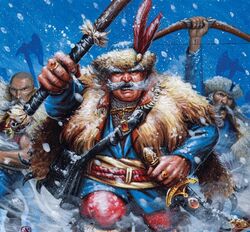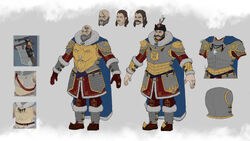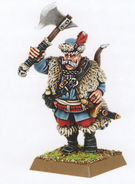"Of course the tzarina is our ruler, and her authority is boundless. You still aren't going in without the boyar's say-so."
- —Dmirov Irinasyn, guard on the armoury at Nekoltra[1a]

A boyar leading a pulk (regiment) of kossars.
The boyars are the middle-rank nobility of Kislev, the nobles who hold real power between the tzars and their own subordinates among the druzhinas and the peasants. They are all ethnic Gospodars, and the rank is universally hereditary.[1b]
As the Motherland's ranking nobles, boyars are powerful men and women within Kislev. They each govern specific areas of Kislev, including scores if not hundreds of stanitsas (villages), as well as larger towns and small cities. Especially large cities are governed by boyars of singular prestige. This is a hereditary rank, although royal edict can raise a person of any birth to the rank. On the battlefield, boyars are tough and doughty fighters -- the best in Kislev, save for Tzarina Katarin herself and her champion, the Golden Knight.[2]
Role[]
"Though all Kislevites are equal in the eyes of the Motherland's gods, a boyar is born to rule. His authority is absolute."
- —Description of the boyars of Kislev in Total War: Warhammer III.[2]

Concept art for a Kislevite boyar created for Total War: Warhammer III.
Across most of Kislev, the boyars are the most powerful individuals and highest-ranking members of the nobility. They are close enough and have enough followers to tell atamans what to do, and any higher authorities are a very long way away. Most boyars allow atamans a great deal of independence, provided that taxes are paid in full and on time because they have more interesting things to do than deal with the petty disputes of a bunch of peasants.[1b]
A recent trend is for boyars to keep a town home in one of Kislev's three major cities -- Kislev City, Erengrad and Praag. Tzarina Katarin Bokha has encouraged this fashion, as boyars living in a city are subject to her authority in practice and theory, but there are still a substantial number of traditional holdouts across the oblasts. Such individuals may be unfashionable and uncultured, but they generally have a firm grip on local power.[1b]
A few boyars suspect Katarin plans to appoint life boyars, boyars who bear the title only for their own lives, possibly even from among the Ungols, and they do not like the idea at all. They have started spreading the idea that being a boyar requires having the right sort of family pedigree, going back several generations at least. The tzarina has, so far, avoided explicitly opposing this idea, but she certainly doesn't support it. Instead, when she appoints boyars to positions of greater responsibility, such as leadership of a pulk (regiment of kossars), she emphasises she is doing it on the basis of ability.[1b]
Many of these oblast boyars see little need for a central government in Kislev at all. This feeling is even more common among Ungols of similar status, though they have no formal rank. They do not openly defy the Ice Queen, as they do not need the trouble, but they pay as little attention to her laws as they can get away with. The tzarina would like to be able to offer the Ungols the rank of boyar in return for an acknowledgement of her authority, but, as noted above, doing so would cause far too many political problems with the existing Gospodar boyars.[1b]
Miniatures[]
Sources[]
- 1: Warhammer Fantasy Roleplay 2nd Edition: Realm of the Ice Queen (RPG)
- 2: Total War: Warhammer III (PC Game)






